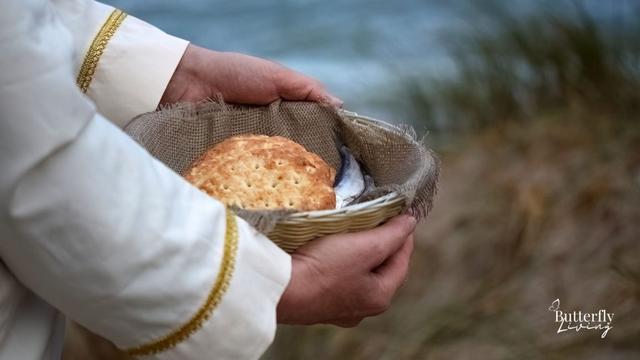The Temptation of Hunger and Fullness

In my last post, we focused on the significance of Jesus going into the wilderness—a time of fasting and prayer, a period of deep spiritual focus. Luke tells us:
"And Jesus, full of the Holy Spirit, returned from the Jordan and was led by the Spirit in the wilderness for forty days, being tempted by the devil. And he ate nothing during those days, and when they were ended, he was hungry."
This was an extended fast, mirroring great fasts of the Old Testament—Moses on Mount Sinai and Elijah on his journey to Mount Horeb. And it’s during this time that Jesus faces temptation. At first, the devil tests Jesus by saying, “If you are the Son of God, command this stone to become bread" (Luke 4:3). Jesus responds, "Man shall not live by bread alone, but by every word that proceeds from the mouth of God” (4:4).
At first glance, this seems simple. Jesus is fasting, dedicating himself to communion with God. When Satan tempts him to break that fast, Jesus refuses. Straightforward, right?
There's no sin in eating, but in this case, Jesus had committed to fasting. And Satan’s temptation is, "Don’t do that. Break your commitment." Jesus’ response—"Man shall not live by bread alone"—reminds us that life is more than just physical needs. That’s a solid takeaway, and if that’s all you take from this, that’s valuable.
What’s fascinating to me is that this is where Satan begins. If you had one shot—if you could tempt Jesus with anything—would this be your first move? Out of all possible temptations, why bread?
It seems like an odd choice until you realize that this temptation had worked before. Not on Jesus, but on his people.
The Israelites Grumble
Exodus 16:2-3 says:
"And the whole congregation of the people of Israel grumbled against Moses and Aaron in the wilderness. And the people of Israel said to them, ‘Would that we had died by the hand of the Lord in the land of Egypt, when we sat by the meat pots and ate bread to the full, for you have brought us out into this wilderness to kill this whole assembly with hunger.’"
The Israelites, who had cried out to God in their slavery, now cry out because they’re hungry in their freedom. They had been living in misery in Egypt under the brutal hand of Pharaoh. But when God answered their cries, rescuing them with a mighty hand, their satisfaction was shortlived. They wanted freedom, but didn’t like the freedom they got. They wanted God’s provision, but they were dissatisfied with his timing and his method.
Now, if you’re a parent, you’ve heard the dramatic complaints of a hungry child. You know the kind—when a child says, "I’m starving!" after just eating a few hours ago. It’s as though the world is ending because they haven’t had a snack in an hour. And it can be overwhelming, over-dramatic, and a little frustrating. But as parents, you also know this is part of the growing process. Children are learning to trust that their needs will be met. It takes time.
However, when adults do the same thing—when we grumble and complain as though God has never provided for us—the amusing complaint of a child becomes something sad and unbecoming.
What does God do in response?
The text says that after the dew had risen, a fine, flaky substance appeared on the ground, something like frost. The Israelites looked at it and asked, "What is it?" And that Hebrew expression is where the name "manna" comes from—"What is it?" Moses explains: "This is the bread that the Lord has given you to eat."
The Thirst for Water
Wouldn’t it be nice if, after experiencing God’s miraculous provision, the Israelites learned their lesson? Wouldn’t it be great if they looked around and trusted that God knew what he was doing? Unfortunately, that’s not what happens.
If only Chapter 16 had been the last time they struggled with trust! But as you turn the page in your Bible, you’ll find the same story playing out once again in Chapter 17, only this time, the issue is thirst instead of hunger. In Exodus 17:2-3, we read:
"Therefore, the people quarreled with Moses and said, 'Give us water to drink.' And Moses said to them, 'Why do you quarrel with me? Why do you test the Lord?'"
At this point, Moses is starting to understand the pattern. But the people are thirsty, and they grumble again:
"Why did you bring us up out of Egypt to kill us and our children and our livestock with thirst?"
They’re not complaining about their slavery in Egypt anymore. They’ve stopped thinking about the misery of captivity. Now, they’re upset because the freedom God gave them doesn’t look like what they expected. Perhaps the God who parted the Red Sea and led them out of Egypt doesn’t know where to find water. The God who created the earth and covered it with water might have forgotten where the water is. Once again, they forget everything God has done for them. They grumble and accuse Moses—and by extension, God—of abandoning them.
To remind them of past lessons, God tells Moses to take the staff—the very same staff that had demonstrated His power in over the Nile—and strike a rock at Horeb. "Behold, I will stand before you there on the rock at Horeb, and you shall strike the rock, and water shall come out of it, and the people will drink." (Exodus 17:6) The staff that had been lifted to turn the Nile to blood is used to remind the people that the same God can make streams in the dessert.
Moses names the place "Massa" (which means “testing”) and "Meribah" (which means “quarreling”) because of the people’s grumbling and their testing of the Lord. What’s crucial here is what God hears when the people complain. He doesn’t just hear their thirst or their hunger; he hears something deeper: "Is the Lord among us or not?" (Exodus 17:7) This is the real question behind their complaints. They’re not saying, "God, we need water." Instead, they mean, "Do you care about us? Are you even here? Are you really God?"
After all the miracles God has performed—rescuing them from slavery, parting the sea, providing manna from heaven—they still doubt. They still test God, asking, "Is he really with us?"
What Did Satan Learn in the Wilderness?
The wilderness is where the Israelites struggled to trust God, but it’s also where we might say that Satan discovered something critical about human nature. And what he learned is this: You can use hunger to turn trust into complaint.
Satan found that little hole in humanity’s heart, the crack where doubts creep in. He realized that by poking at people's discomfort, he could turn their trust into doubt and dissatisfaction. And he put that knowledge into action when he tempted Jesus in the wilderness. After fasting for 40 days in the wilderness, Jesus was hungry. Satan approached him with a challenge: "If you are the Son of God, command this stone to become bread."
Satan wasn’t just asking Jesus to perform a miracle; he was challenging everything that Jesus stood for.
Just admit for a moment, Satan says, that those people were really hungry, and they had a point. Admit for just one moment that sometimes this God you trust in doesn't provide for your every need, and you have to take matters into your own hands. Admit for just this moment that you're hungry, and God isn't going to do a thing about it.
Are you the Son of God or not? Is the Lord among us or not? Are you the same God who provided manna in the wilderness? Are you the same God who recognized his mistake, that he had ignored his people, and after hearing their cries, gave them bread? Are you that same God? Will you just admit that it stinks to be hungry and now make yourself some bread?
Jesus, you're not against making bread. You do it all the time. It's one of your favorite tricks. Don't you know, in just a few chapters, you're going to feed thousands of people with loaves and fishes? You've got no problem making bread. Just admit you're hungry. Admit God hasn't done a thing for you and make yourself some bread. Just admit those people in the wilderness might have had a point. Sometimes God isn't all he's supposed to be.
And then when you're done, feed everybody else that's hungry. In this world that God made, there are hungry children. And here you are, the Messiah, who could make all the bread anybody could ever want.
Just do something about it.
Satan was tempting Jesus to fall into the same trap—to act instead of trust. But Jesus made it clear that he understood the lesson Israel never learned.
The Point of Hunger and Fullness
Jesus answered, "It is written, man shall not live by bread alone." This is not just a denial of the temptation. It’s a declaration of trust in God’s provision.
Notice that Jesus didn’t just say, "Man shall not live by bread alone." He started with "It is written." Jesus was quoting Deuteronomy, specifically from a passage that retells the lessons of the Exodus. This is where the wilderness journey is given its meaning. What Jesus was really saying is, "Satan, you missed the point." The lesson the Israelites were supposed to learn in the wilderness wasn’t about physical sustenance. It was about trusting God, even when we’re hungry, thirsty, or uncomfortable.
In quoting Deuteronomy, Jesus highlighted two important lessons that were supposed to be learned in the wilderness.
The first lesson is in Deuteronomy 8:3:
"And he humbled you and let you hunger and fed you with manna, which you did not know, nor did your fathers know, that he might make you know that man does not live by bread alone, but man lives by every word that comes from the mouth of the Lord."
In Exodus, we first encounter the story of the manna. But before the Israelites enter the Promised Land, Moses gives them a second telling of the story in Deuteronomy. This isn’t just a recap—it’s a teaching moment. Moses is making sure they understand the lessons they were supposed to learn in the wilderness. And the first lesson? The Israelites were supposed to learn that the same God who parted the Red Sea, the same God who rescued them from Egypt, knew exactly what they needed—even when they were hungry.
Hunger is a reminder of our dependence on God. People who are late for dinner say they’re “starving,” but it’s because they’ve never missed a meal in their lives. They haven’t experienced the reality of going without. It’s easy to take God’s provision for granted when we’ve never truly been without. But hunger—whether literal or metaphorical—teaches us something we can’t learn when we’re full: We need God.
The second lesson comes later in the text, where Moses reminds the Israelites of the blessings they will experience when they enter the Promised Land. They will eat until they are full, with no scarcity of food. But Moses gives them a warning: When you are full, be careful.
Why? Because fullness can lead to forgetfulness. When we have everything we need and more, it’s easy to think we did it all ourselves. We forget the God who provided for us. But in those moments of fullness, we must remember the lessons of hunger.
When we are full, we are called to bless the Lord for his goodness. We must remember the Source of all our blessings and keep him in the rightful place of honor in our hearts.
Jesus Learned from Hunger
Here’s something that blows my mind every time I think about it: Jesus learned from hunger. The all-knowing, omnipotent God who became flesh still needed to experience hunger to understand what it means to trust God through difficulty.
In Hebrews 5:7-8, it says:
"In the days of His flesh, Jesus offered up prayers and supplications with loud cries and tears to Him who was able to save Him from death. And He was heard because of His reverence. Although He was a Son, He learned obedience through what He suffered."
Jesus learned obedience through suffering. He experienced hunger, pain, and temptation. And in those moments, he learned to trust God the Father. His obedience was forged in those difficult moments. And when he faced the ultimate test on the cross, he was ready.
Whether you’re in a season of hunger (physical, emotional, or spiritual), or a time of fullness, there’s a lesson to be learned.
If you’re hungry, whether literally or in some other way, see it as an opportunity to learn to trust. God is using this moment to teach you to rely on him and to trust in his provision.
If you are full, remember the hunger. Take a moment to reflect on the times when you were in need, and give thanks to God for his provision. Don’t let the blessings cloud your gratitude.
And if you’re complaining, stop and repent. You cannot obey a God you do not trust, and you cannot trust a God you are complaining about.
As the old hymn says: "Riches I heed not, nor man's empty praise. Be Thou my inheritance now and always." God either takes first place in our hearts, or he doesn’t take any place at all. Whether hungry or full, may we put God in his rightful place as the One who provides and sustains.
Dr. Benjamin Williams is the Senior Minister at the Central Church of Christ in Ada, Oklahoma and a regular writer at So We Speak. Check out his books The Faith of John’s Gospel and Why We Stayed or follow him on Twitter, @Benpreachin.






